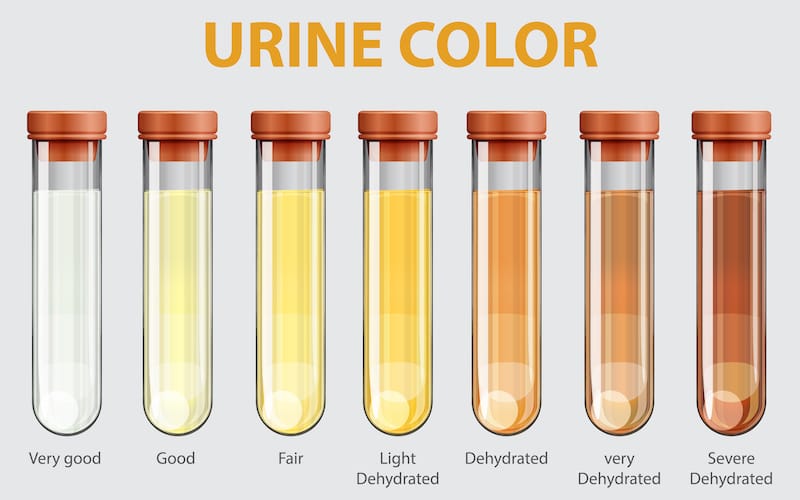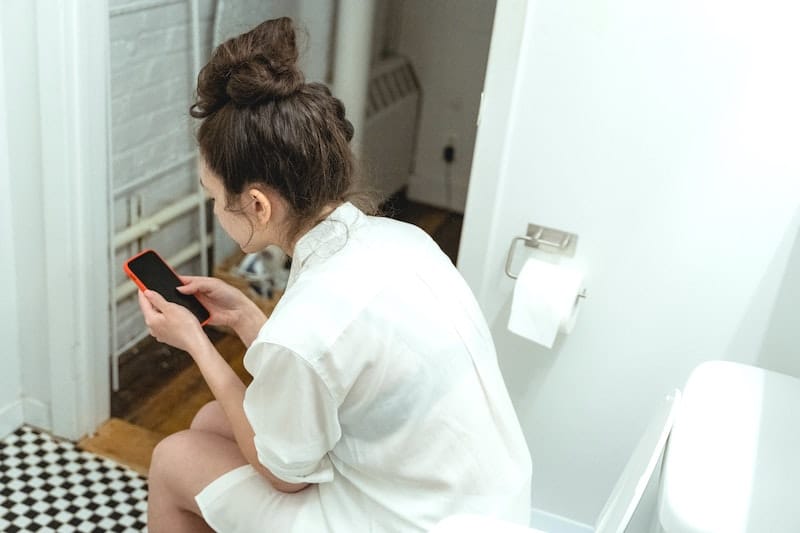Urine with higher density means it has more salt than the water but can also be more protein. In fact, it is not the amount of salt in the urine, it is the lack of water. People who are a bit dehydrated have concentrated urine, it is denser due to the salt in it, and it sinks. There are so many things to learn about your health just by checking your urine; the color, the smell, and even the consistency can tell you quite a lot.
Different urine colors and what they indicate
The easiest character to spot about urine is its color, and just by simply identifying the shade, you could tell if someone is drinking too much or needs to drink more water.

Clear white
There is such thing as drinking too much water or overhydration. Having too much water in your body could minimize your electrolytes which is not something to be alarmed about but is also not good for your body.
Clear white urine can also indicate liver problems like cirrhosis and viral hepatitis.
If you’re not consuming too much water and have ongoing clear urine, you should see your doctor.
Pale yellow/yellowish
This is the typical urine color; the urochrome pigment is naturally in our urine and becomes more diluted as we drink water.
Pale yellow-colored urine is considered the ideal shade that indicates you have been drinking sufficient water within the day.
Dark yellow
This shade is still considered a normal color of urine, but you might be advised to add another glass or 2 to your water intake every day.
You are not dehydrated, but you are not far from it either.
Opposite this dark hue, having a lot of B-vitamins in your bloodstream can cause urine to appear neon yellow instead.
Amber or honey color
This color indicates mild dehydration, and it means there is not enough water in your body to dilute the urochrome pigment to make it lighter.
You could be drinking enough water, but if you are sweating as much due to weather or workout, you should increase your water intake to prevent dehydration.
Orange
Some medications could turn your pee into this color, but if you are not drinking any medication, you might be dehydrated and need to catch up on your water intake.
In some cases, if you feel like you are drinking enough water, but your urine is still orange, it is better to consult your doctor because you could have a liver or bile duct condition.
Dark orange or brown
This could indicate severe dehydration that will need urgent medical treatment, which could also indicate liver disease or porphyria.
Some medications like metronidazole, nitrofurantoin, and chloroquine could also cause this color of urine if you take a large amount of food, including rhubarb, fava beans, or aloe.
Pink or red
Some food like beets, rhubarb, or blueberries could cause your urine to have pink or magenta pigments, while some health conditions can cause blood to appear in your urine, a symptom known as hematuria.
Some medications could cause your urine to turn pink or red, like senna or senna-containing laxatives, phenazopyridine, and the antibiotic rifampin.
Blue or green
This urine color could be caused by previous medical tests performed on your kidneys or bladder, it can be the result of dyes used.
A medical condition called pseudomonas aeruginosa is a bacterial infection that can cause your urine to turn blue, green, or even indigo purple.
It is always best to talk to your doctor in these instances.
How to stay hydrated

- Drink enough water – It is still the easiest and cheapest way to stay hydrated. If you don’t like the taste of your water, you can add some flavor by adding some slices of lemon or cucumber. The U.S. National Academies of Sciences, Engineering, and Medicine determined that an adequate daily fluid intake is about 15.5 cups (3.7 liters) of fluids for men. About 11.5 cups (2.7 liters) of fluids a day for women.
- Limit caffeine and alcohol intake – Indeed, you can still get your portion of water from caffeinated drinks (coffee, tea, and soda). Still, it’s best to limit your caffeine intake because it may cause some people to urinate more frequently or feel anxious or jittery, and some choices may add extra calories from sugar to your diet.
- Drink a lot if you sweat a lot – Drink water before, during, and after a workout. Sports drinks can be helpful if you are planning to exercise for more than an hour. They contain carbohydrates and electrolytes that can increase your energy and help your body absorb water. However, some sports drinks are high in calories from added sugar. They also may contain high levels of sodium (salt).
- Eat fruits and vegetables – It’s no secret that you can also get your water from fruits and vegetables like tomatoes, cucumbers, strawberries, cabbage, zucchini, lettuce, and melons. You could be eating a salad and rehydrating while doing so. Fruits are also a healthier option for snacks or desserts.
- Drink according to the weather – Let us not forget how the weather affects our water consumption. If you tend to sweat more than you usually would during summertime, it is best to drink more water than you typically do. Do not wait for your thirst before drinking your water. You are already a little bit dehydrated when that happens. Set some reminders on when to drink water, especially if it’s a hot day.
FAQs
What are other symptoms of dehydration?
Besides the color of your urine, other signs could tell if you are dehydrated, like dry mouth and tongue, urinating less than usual, extreme thirst, headache, dizziness, and fatigue are just some of the most common.
What color is your pee if you have diabetes?
Diabetes can cause cloudy urine when too much sugar builds up in your urine.
Your urine may also smell sweet or fruity. Diabetes can also lead to kidney complications or increase the risk of infections of the urinary tract, making your urine appear cloudy.
Conclusion
It is always best to proactively observe your body and how it reacts to your diet and your lifestyle, in general, to stop something from getting worse.
I am not saying that you should obsess over the small details daily, but it will surely be helpful if you know your body well.
Do not hesitate to reach out to your local healthcare provider if you feel that there is something wrong with your urine and other areas of your health.


